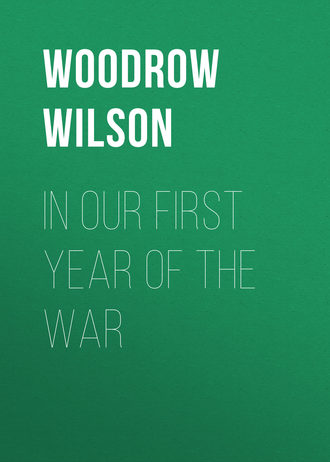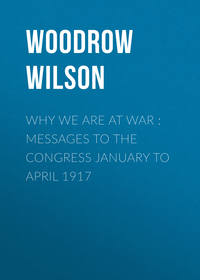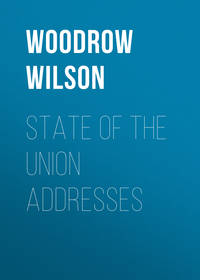 полная версия
полная версияIn Our First Year of the War
THE MEN OF THE RAILWAYS
To the men who run the railways of the country, whether they be managers or operative employees, let me say that the railways are the arteries of the nation's life and that upon them rests the immense responsibility of seeing to it that those arteries suffer no obstruction of any kind, no inefficiency or slackened power. To the merchant let me suggest the motto, "Small profits and quick service," and to the shipbuilder the thought that the life of the war depends upon him. The food and the war supplies must be carried across the seas, no matter how many ships are sent to the bottom. The places of those that go down must be supplied, and supplied at once. To the miner let me say that he stands where the farmer does: the work of the world waits on him. If he slackens or fails, armies and statesmen are helpless. He also is enlisted in the great Service Army. The manufacturer does not need to be told, I hope, that the nation looks to him to speed and perfect every process; and I want only to remind his employees that their service is absolutely indispensable and is counted on by every man who loves the country and its liberties.
Let me suggest also that every one who creates or cultivates a garden helps, and helps greatly, to solve the problem of the feeding of the nations; and that every housewife who practises strict economy puts herself in the ranks of those who serve the nation. This is the time for America to correct her unpardonable fault of wastefulness and extravagance. Let every man and every woman assume the duty of careful, provident use and expenditure as a public duty, as a dictate of patriotism which no one can now expect ever to be excused or forgiven for ignoring.
THE SUPREME TEST
In the hope that this statement of the needs of the nation and of the world in this hour of supreme crisis may stimulate those to whom it comes and remind all who need reminder of the solemn duties of a time such as the world has never seen before, I beg that all editors and publishers everywhere will give as prominent publication and as wide circulation as possible to this appeal. I venture to suggest also to all advertising agencies that they would perhaps render a very substantial and timely service to the country if they would give it widespread repetition. And I hope that clergymen will not think the theme of it an unworthy or inappropriate subject of comment and homily from their pulpits.
The supreme test of the nation has come. We must all speak, act and serve together.
V
THE CONSCRIPTION PROCLAMATION
Whereas, Congress has enacted and the President has on the 18th day of May, 1917, approved a law which contains the following provisions:
Section 5. That all male persons between the ages of twenty-one and thirty, both inclusive, shall be subject to registration in accordance with regulations to be prescribed by the President, and upon proclamation by the President or other public notice given by him or by his direction, stating the time and place of such registration, it shall be the duty of all persons of the designated ages, except officers and enlisted men of the Regular Army, the Navy and the National Guard and Naval Militia while in the service of the United States, to present themselves for and submit to registration under the provisions of this act.
And every such person shall be deemed to have notice of the requirements of this act upon the publication of said proclamation or other notice as aforesaid given by the President or by his direction.
THE PENALTY FOR FAILURE
And any person who shall wilfully fail or refuse to present himself for registration or to submit thereto as herein provided, shall be guilty of a misdemeanor and shall, upon conviction in the District Court of the United States having jurisdiction thereof, be punished by imprisonment for not more than one year, and shall thereupon be duly registered.
Provided, that in the call of the docket preference shall be given, in courts trying the same, to the trial of criminal proceedings under this act.
Provided, further, that persons shall be subject to registration as herein provided who shall have attained their twenty-first birthday and who shall not have attained their thirty-first birthday on or before the day set for the registration, and all persons so registered shall be and remain subject to draft into the forces hereby authorized unless exempted or excused therefrom, as in this act provided.
Provided, further, that in the case of temporary absence from actual place of legal residence of any person liable to registration as provided herein, such registration may be made by mail under regulations to be prescribed by the President.
THE WORK OF REGISTRATION
Section 6. That the President is hereby authorized to utilize the service of any or all departments and any or all officers or agents of the United States and of the several States, Territories and the District of Columbia and subdivisions thereof, in the execution of this act, and all officers and agents of the United States and of the several States, Territories and subdivisions thereof, and of the District of Columbia, and all persons designated or appointed under regulations prescribed by the President, whether such appointments are made by the President himself or by the Governor or other officer of any State or Territory to perform any duty in the execution of this act, are hereby required to perform such duty as the President shall order or direct, and all such officers and agents and persons so designated or appointed shall hereby have full authority for all acts done by them in the execution of this act, by the direction of the President. Correspondence in the execution of this act may be carried in penalty envelopes bearing the frank of the War Department.
NEGLECT OF DUTY AND FRAUD
Any person charged, as herein provided, with the duty of carrying into effect any of the provisions of this act or the regulations made or directions given thereunder who shall fail or neglect to perform such duty, and any person charged with such duty or having and exercising any authority under said act, regulations or directions, who shall knowingly make or be a party to the making of any false or incorrect registration, physical examination, exemption, enlistment, enrolment or muster.
And any person who shall make or be a party to the making of any false statement or certificate as to the fitness or liability of himself or any other person for service under the provisions of this act, or regulations made by the President thereunder, or otherwise evades or aids another to evade the requirements of this act or of said regulations, or who, in any manner, shall fail or neglect fully to perform any duty required of him in the execution of this act, shall, if not subject to military law, be guilty of a misdemeanor and upon conviction in the District Court of the United States having jurisdiction thereof be punished by imprisonment for not more than one year, or, if subject to military law, shall be tried by court martial and suffer such punishment as a court martial may direct.
A CALL TO GOVERNORS
Now, therefore, I, Woodrow Wilson, President of the United States, do call upon the Governor of each of the several States and Territories, the Board of Commissioners of the District of Columbia and all officers and agents of the several States and Territories, of the District of Columbia, and of the counties and municipalities therein, to perform certain duties in the execution of the foregoing law, which duties will be communicated to them directly in regulations of even date herewith.
And I do further proclaim and give notice to all persons subject to registration in the several States and in the District of Columbia, in accordance with the above law, that the time and place of such registration shall be between 7 A.M. and 7 P.M. on the 5th day of June, 1917, at the registration place in the precinct wherein they have their permanent homes.
Those who shall have attained their twenty-first birthday and who shall not have attained their thirty-first birthday on or before the day here named are required to register, excepting only officers and enlisted men of the Regular Army, the Navy, the Marine Corps and the National Guard and Naval Militia while in the service of the United States, and officers in the Officers' Reserve Corps and enlisted men in the enlisted Reserve Corps while in active service. In the Territories of Alaska, Hawaii and Porto Rico a day for registration will be named in a later proclamation.
REGISTRATION BY MAIL
And I do hereby charge those who, through sickness, shall be unable to present themselves for registration that they apply on or before the day of registration to the County Clerk of the county where they may be for instructions as to how they may be registered by agent.
Those who expect to be absent on the day named from the counties in which they have their permanent homes may register by mail, but their mailed registration cards must reach the places in which they have their permanent homes by the day named herein. They should apply as soon as practicable to the County Clerk of the county wherein they may be for instructions as to how they may accomplish their registration by mail.
In case such persons as, through sickness or absence, may be unable to present themselves personally for registration shall be sojourning in cities of over 30,000 population, they shall apply to the City Clerk of the city wherein they may be sojourning rather than to the Clerk of the county.
The Clerks of counties and of cities of over 30,000 population, in which numerous applications from the sick and from non-residents are expected, are authorized to establish such sub-agencies and to employ and deputize such clerical force as may be necessary to accommodate these applications.
THE WHOLE NATION AN ARMY
The Power against which we are arrayed has sought to impose its will upon the world by force. To this end it has increased armament until it has changed the face of war. In the sense in which we have been wont to think of armies there are no armies in this struggle, there are entire nations armed.
Thus, the men who remain to till the soil and man the factories are no less a part of the army that is in France than the men beneath the battle flags.
It must be so with us. It is not an army that we must shape and train for war–it is a Nation. To this end our people must draw close in one compact front against a common foe. But this cannot be if each man pursues a private purpose. All must pursue one purpose. The Nation needs all men, but it needs each man, not in the field that will most pleasure him, but in the endeavor that will best serve the common good.
Thus, though a sharpshooter pleases to operate a trip-hammer for the forging of great guns, and an expert machinist desires to march with the flag, the Nation is being served only when the sharpshooter marches and the machinist remains at his levers. The whole Nation must be a team, in which each man shall play the part for which he is best fitted.
NOT A DRAFT OF THE UNWILLING
To this end Congress has provided that the Nation shall be organized for war by selection, that each man shall be classified for service in the place to which it shall best serve the general good to call him.
The significance of this cannot be overstated. It is a new thing in our history and a landmark in our progress. It is a new manner of accepting and vitalizing our duty to give ourselves with thoughtful devotion to the common purpose of us all. It is in no sense a conscription of the unwilling. It is, rather, selection from a Nation which has volunteered in mass.
It is no more a choosing of those who shall march with the colors than it is a selection of those who shall serve an equally necessary and devoted purpose in the industries that lie behind the battle-lines.
The day here named is the time upon which all shall present themselves for assignment to their tasks. It is for that reason destined to be remembered as one of the most conspicuous moments in our history. It is nothing less than the day upon which the manhood of the country shall step forward in one solid rank in defense of the ideals to which this Nation is consecrated. It is important to those ideals, no less than to the pride of this generation in manifesting its devotion to them, that there be no gaps in the ranks.
DAY OF PATRIOTIC DEVOTION
It is essential that the day be approached in thoughtful apprehension of its significance and that we accord to it the honor and the meaning that it deserves. Our industrial need prescribes that it be not made a technical holiday, but the stern sacrifice that is before us urges that it be carried in all our hearts as a great day of patriotic devotion and obligation, when the duty shall lie upon every man, whether he is himself to be registered or not, to see to it that the name of every male person of the designated ages is written on these lists of honor.
In witness whereof, I have hereunto set my hand and caused the seal of the United States to be affixed.
Done at the city of Washington this 18th day of May, in the year of our Lord, 1917, and of the independence of the United States of America the one hundred and forty-first.
By the President: Robert Lansing,
Secretary of State.
VI
CONSERVING THE NATION'S FOOD
It is very desirable, in order to prevent misunderstanding or alarms and to assure co-operation in a vital matter, that the country should understand exactly the scope and purpose of the very great powers which I have thought it necessary, in the circumstances, to ask the Congress to put in my hands with regard to our food-supplies.
Those powers are very great, indeed, but they are no greater than it has proved necessary to lodge in the other Governments which are conducting this momentous war, and their object is stimulation and conservation, not arbitrary restraint or injurious interference with the normal processes of production. They are intended to benefit and assist the farmer and all those who play a legitimate part in the preparation, distribution and marketing of foodstuffs.
A SHARP LINE OF DISTINCTION
It is proposed to draw a sharp line of distinction between the normal activities of the Government, represented in the Department of Agriculture, in reference to food production, conservation and marketing, on the one hand, and the emergency activities necessitated by the war, in reference to the regulation of food distribution and consumption, on the other.
All measures intended directly to extend the normal activities of the Department of Agriculture, in reference to the production, conservation and the marketing of farm crops, will be administered, as in normal times, through that department; and the powers asked for over distribution and consumption, over exports, imports, prices, purchase and requisition of commodities, storing and the like, which may require regulation during the war, will be placed in the hands of a Commissioner of Food Administration, appointed by the President and directly responsible to him.
THE END TO BE ATTAINED
The objects sought to be served by the legislation asked for are: Full inquiry into the existing available stocks of foodstuffs and into the costs and practices of the various food producing and distributing trades; the prevention of all unwarranted hoarding of every kind, and of the control of foodstuffs by persons who are not in any legitimate sense producers, dealers or traders; the requisition, when necessary for public use, of food supplies and of the equipment necessary for handling them properly; the licensing of wholesome and legitimate mixtures and milling percentages, and the prohibition of the unnecessary or wasteful use of foods.
Authority is asked also to establish prices, but not in order to limit the profits of the farmers, but only to guarantee to them, when necessary, a minimum price, which will insure them a profit where they are asked to attempt new crops, and to secure the consumer against extortion by breaking up corners and attempts at speculation when they occur, by fixing temporarily a reasonable price at which middlemen must sell.
THE FIXING OF PRICES
I have asked Mr. Herbert Hoover to undertake this all-important task of food administration. He has expressed his willingness to do so, on condition that he is to receive no payment for his services, and that the whole of the force under him, exclusive of clerical assistance, shall be employed, as far as possible, upon the same volunteer basis.
He has expressed his confidence that this difficult matter of food administration can be successfully accomplished through the voluntary co-operation and direction of legitimate distributers of foodstuffs and with the help of the women of the country.
Although it is absolutely necessary that unquestionable powers shall be placed in my hands, in order to insure the success of this administration of the food-supplies of the country, I am confident that the exercise of those powers will be necessary only in the few cases where some small and selfish minority proves unwilling to put the Nation's interests above personal advantage, and that the whole country will heartily support Mr. Hoover's efforts by supplying the necessary volunteer agencies throughout the country for the intelligent control of food consumption, and securing the co-operation of the most capable leaders of the very interests most directly affected, that the exercise of the powers deputed to him will rest very successfully upon the good-will and co-operation of the people themselves, and that the ordinary economic machinery of the country will be left substantially undisturbed.
NO FEAR OF BUREAUCRACY
The proposed food administration is intended, of course, only to meet a manifest emergency and to continue only while the war lasts. Since it will be composed for the most part of volunteers, there need be no fear of the possibility of a permanent bureaucracy arising out of it.
All control of consumption will disappear when the emergency has passed. It is with that object in view that the Administration considers it to be of pre-eminent importance that the existing associations of producers and distributers of foodstuffs should be mobilized and made use of on a volunteer basis. The successful conduct of the projected food administration, by such means, will be the finest possible demonstration of the willingness, the ability and the efficiency of democracy and of its justified reliance upon the freedom of individual initiative.
The last thing that any American could contemplate with equanimity would be the introduction of anything resembling Prussian autocracy into the food control of this country.
It is of vital interest and importance to every man who produces food and to every man who takes part in its distribution that these policies, thus liberally administered, should succeed and succeed altogether. It is only in that way that we can prove it to be absolutely unnecessary to resort to the rigorous and drastic measures which have proved to be necessary in some of the European countries.
VII
AN ANSWER TO CRITICS
(May 22, 1917)In the following letter, addressed to Representative Heflin, Democrat, of Alabama, President Wilson replies to criticisms regarding his position with regard to the war and its objects:
It is incomprehensible to me how any frank or honest person could doubt or question my position with regard to the war and its objects. I have again and again stated the very serious and long-continued wrongs which the Imperial German Government has perpetrated against the rights, the commerce and the citizens of the United States. The list is long and overwhelming. No Nation that respected itself or the rights of humanity could have borne those wrongs any longer.
Our objects in going into the war have been stated with equal clearness. The whole of the conception which I take to be the conception of our fellow-countrymen with regard to the outcome of the war and the terms of its settlement, I set forth with the utmost explicitness in an address to the Senate of the United States on the 22d of January last. Again, in my message to Congress on the 2d of April last, those objects were stated in unmistakable terms.
I can conceive no purpose in seeking to becloud this matter except the purpose of weakening the hands of the Government and making the part which the United States is to play in this great struggle for human liberty an inefficient and hesitating part.
We have entered the war for our own reasons and with our own objects clearly stated, and shall forget neither the reasons nor the objects. There is no hate in our hearts for the German people, but there is a resolve which cannot be shaken even by misrepresentation, to overcome the pretensions of the autocratic Government which acts upon purposes to which the German people have never consented.
VIII
MEMORIAL DAY ADDRESS
In one sense the great struggle into which we have now entered is an American struggle, because it is in defense of American honor and American rights, but it is something even greater than that; it is a world struggle. It is the struggle of men who love liberty everywhere, and in this cause America will show herself greater than ever because she will rise to a greater thing.
The program has conferred an unmerited dignity upon the remarks I am going to make by calling them an address, because I am not here to deliver an address [said the President]. I am here merely to show in my official capacity the sympathy of this great Government with the object of this occasion, and also to speak just a word of the sentiment that is in my own heart.
Any memorial day of this sort is, of course, a day touched with sorrowful memory, and yet I for one do not see how we can have any thought of pity for the men whose memory we honor to-day. I do not pity them. I envy them, rather, because their great work for liberty is accomplished, and we are in the midst of a work unfinished, testing our strength where their strength already has been tested.
A HERITAGE FROM THE DEAD
There is a touch of sorrow, but there is a touch of reassurance also in a day like this, because we know how the men of America have responded to the call of the cause of liberty, and it fills our mind with a perfect assurance that that response will come again in equal measures, with equal majesty and with a result which will hold the attention of all mankind.
When you reflect upon it, these men who died to preserve the Union died to preserve the instrument which we are now using to serve the world–a free nation espousing the cause of human liberty. In one sense the great struggle into which we have now entered is an American struggle, because it is in the sense of American honor and American rights, but it is something even greater than that; it is a world struggle. It is a struggle of men who love liberty everywhere; and in this cause America will show herself greater than ever because she will rise to a greater thing.
We have said in the beginning that we planned this great Government that men who wish freedom might have a place of refuge and a place where their hope could be realized, and now, having established such a Government, having preserved such a Government, having vindicated the power of such a Government, we are saying to all mankind, "We did not set this Government up in order that we might have a selfish and separate liberty, for we are now ready to come to your assistance and fight out upon the fields of the world the cause of human liberty."
AMERICA'S FULL FRUITION
In this thing America attains her full dignity and the full fruition of her great purpose.
No man can be glad that such things have happened as we have witnessed in these last fateful years, but perhaps it may be permitted to us to be glad that we have an opportunity to show the principles which we profess to be living–principles which live in our hearts–and to have a chance by the pouring out of our blood and treasure to vindicate the things which we have professed. For, my friends, the real fruition of life is to do the things we have said we wished to do. There are times when words seem empty and only action seems great. Such a time has come, and in the providence of God America will once more have an opportunity to show to the world that she was born to serve mankind.







